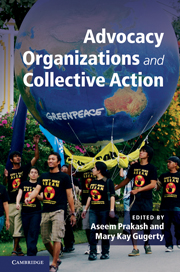Book contents
- Frontmatter
- Contents
- Figures and tables
- Contributors
- Preface
- Acknowledgments
- 1 Advocacy organizations and collective action
- Part 1 The institutional environment and advocacy organizations
- Part 2 Advocacy tactics and strategies
- Part 3 International advocacy and market structures
- Part 4 Toward a new research program
- Index
- References
1 - Advocacy organizations and collective action
an introduction
Published online by Cambridge University Press: 05 June 2012
- Frontmatter
- Contents
- Figures and tables
- Contributors
- Preface
- Acknowledgments
- 1 Advocacy organizations and collective action
- Part 1 The institutional environment and advocacy organizations
- Part 2 Advocacy tactics and strategies
- Part 3 International advocacy and market structures
- Part 4 Toward a new research program
- Index
- References
Summary
The volume outlines a new agenda for the study of advocacy organizations, which are often known as non-governmental organizations (NGOs) and social movement organizations. Instead of viewing advocacy NGOs as actors that are primarily motivated by principled beliefs, immune from collective action challenges, and prone to collaborating with other advocacy actors, we suggest modeling NGOs as collective actors that seek to fulfill both normative concerns and instrumental incentives, face collective action problems, and compete as well as collaborate with other advocacy actors that function in the same issue area. Because advocacy NGOs and firms share important characteristics (notwithstanding their differences), the firm analogy, we suggest, is an analytically useful way of studying advocacy actors.
The collective action perspective provides a unifying analytical approach to the study of advocacy NGOs and firms (as well as governments) because it directs attention to the core challenges inherent in structuring and managing collective actors. This approach suggests the need to move beyond viewing NGOs as “saints” and firms as “sinners.” Indeed, the study of how and why hierarchies, networks, and alliances arise and are maintained in the context of firms can illuminate issues such as how advocacy NGOs and their networks emerge, how they internally organize, and how they strategize. We agree with Thomas Risse (this volume) that scholars interested in examining the structures, policies, and strategies of firms and their networks can derive useful insights from studying advocacy NGOs.
- Type
- Chapter
- Information
- Advocacy Organizations and Collective Action , pp. 1 - 28Publisher: Cambridge University PressPrint publication year: 2010
References
- 29
- Cited by



